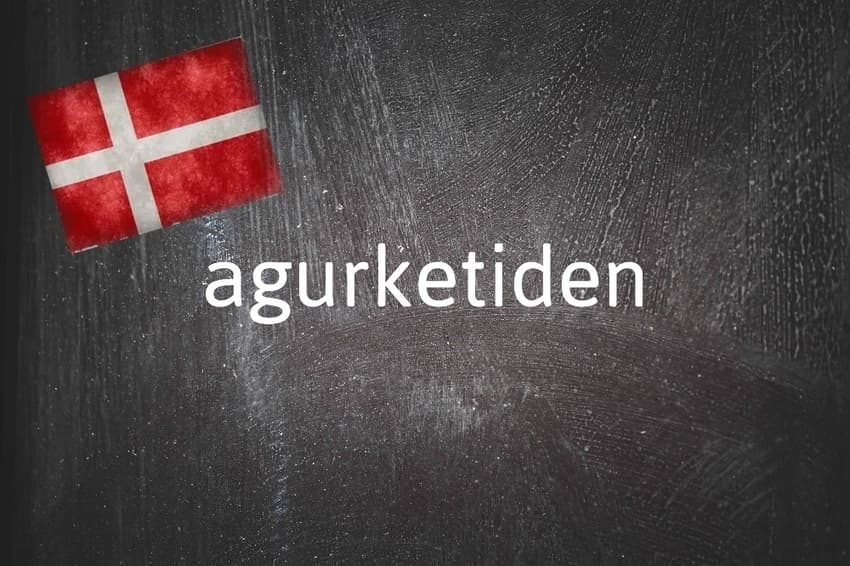Danish word of the day: Agurketiden

Photo by Francesco Ungaro on Unsplash and Nicolas Raymond/FlickR
It’s not salad days for current events in Denmark.
What is agurketiden?
Agurk is the Danish word for “cucumber”. It has its roots in Greek, unlike the English word which is taken from the Latin name of the plant on which the vegetable grows.
Tid is Danish for time, and the definitive form used here, tiden (literally “the time”) can signify a period in time as well as time as an abstract concept.
For example, if you say tiden er inde (roughly, “the time is now”), you are talking about the concept of time. The same applies with tiden er gået (“time is up”).
On the other hand, you can talk about tiden under andenverdenskrig (“the period during the Second World War”) or Oplysningstiden (the Age of Enlightenment).
The meaning of tiden in agurketiden is the latter of the two just described, so agurketiden is literally “the age of cucumber”.
As an aside, if you want to ask what the time of day is, you don’t say tiden but instead klokken, so the phrase you would need is hvad er klokken? This is literally “what is the clock?” but means “what is the time?”
Why do I need to know agurketiden?
The summer season, especially July when many people including politicians are on holiday, is often referred in Danish to as agurketiden because of a lack of current events in the news.
By extension, agurketiden can be used to in relation to news that is unimportant and frequently about ridiculous events.
The word can be traced back to the German word Sauregurkenzeit, which directly translated means “sour cucumber time”. In German, this term was eventually used to describe a slow news day. From here, we can see why agurketiden is used to describe the situation in the summer when there is little news to write about.
In English, it is often referred to as “silly season”. This is because the summer was when journalists would traditionally take their holiday, leaving editors sceptical of giving any serious reporting pieces to the summer stand-ins. Frivolous news stories therefore have a reputation for being reported during the summer months.
Example
Det må virkelig være agurketiden, når en anerkendt avis som Jyllands-Posten bruger så meget spalteplads på en kongelig fest.
It must really be silly season for a reputable newspaper like Jyllands-Posten to spend so many column inches on a royal party.
Comments
See Also
What is agurketiden?
Agurk is the Danish word for “cucumber”. It has its roots in Greek, unlike the English word which is taken from the Latin name of the plant on which the vegetable grows.
Tid is Danish for time, and the definitive form used here, tiden (literally “the time”) can signify a period in time as well as time as an abstract concept.
For example, if you say tiden er inde (roughly, “the time is now”), you are talking about the concept of time. The same applies with tiden er gået (“time is up”).
On the other hand, you can talk about tiden under andenverdenskrig (“the period during the Second World War”) or Oplysningstiden (the Age of Enlightenment).
The meaning of tiden in agurketiden is the latter of the two just described, so agurketiden is literally “the age of cucumber”.
As an aside, if you want to ask what the time of day is, you don’t say tiden but instead klokken, so the phrase you would need is hvad er klokken? This is literally “what is the clock?” but means “what is the time?”
Why do I need to know agurketiden?
The summer season, especially July when many people including politicians are on holiday, is often referred in Danish to as agurketiden because of a lack of current events in the news.
By extension, agurketiden can be used to in relation to news that is unimportant and frequently about ridiculous events.
The word can be traced back to the German word Sauregurkenzeit, which directly translated means “sour cucumber time”. In German, this term was eventually used to describe a slow news day. From here, we can see why agurketiden is used to describe the situation in the summer when there is little news to write about.
In English, it is often referred to as “silly season”. This is because the summer was when journalists would traditionally take their holiday, leaving editors sceptical of giving any serious reporting pieces to the summer stand-ins. Frivolous news stories therefore have a reputation for being reported during the summer months.
Example
Det må virkelig være agurketiden, når en anerkendt avis som Jyllands-Posten bruger så meget spalteplads på en kongelig fest.
It must really be silly season for a reputable newspaper like Jyllands-Posten to spend so many column inches on a royal party.
Join the conversation in our comments section below. Share your own views and experience and if you have a question or suggestion for our journalists then email us at [email protected].
Please keep comments civil, constructive and on topic – and make sure to read our terms of use before getting involved.
Please log in here to leave a comment.